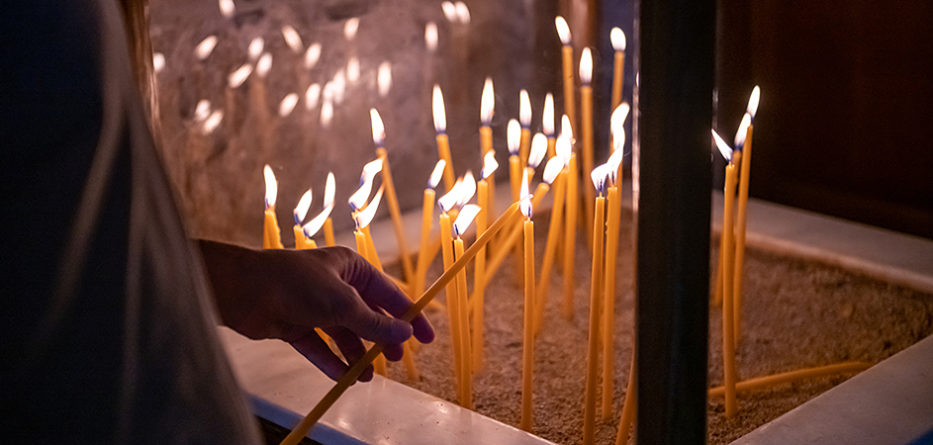As Pope Francis visits Cyprus, Ninos Josephides offers insights into the Maronite Catholic community there, saying Cypriots worked hard to ensure the Pope received a warm welcome.
Catholics across Cyprus are gearing up to welcome Pope Francis to the Mediterranean nation for his 3-day Apostolic Journey.
Preparations are in full swing, as choirs wrap up their final rehearsals and venues are spruced up to welcome the second Pope to visit in just over a decade.
Pope Benedict XVI came to the island in 2010. One of the many who helped prepare for that visit was Ninos Josephides, a Catholic of the Maronite rite.
He spoke to Vatican News about expectations for Pope Francis’ visit, and about the situation of the Maronite community in Cyprus.
Mr. Josephides said Cyriot Catholics are expecting to offer “a glorious welcome for Pope Francis” and are working to do everything to guarantee the success of the visit.
He is doing his part by singing in a choir which will animate the Mass on Friday at the Pancyprian Gymnastic Association (GSP) Stadium in the capital, Nicosia.
The choir offers a cross-section of the Catholic community in Cyprus.
Mr. Josephides said the choir is comprised of “various nationalities living in Cyprus: Cypriot Catholic Maronites, Latin rite Catholics, Lebanese Maronites, and a lot of Catholic workers, mostly from the Philippines.”
‘Warm spirit of welcome’
Though the local community is excited to welcome the Pope, Mr. Josephides admitted that Covid-19 is “a big factor in people’s psychology on whether to go the stadium or not”, though several thousand people have already signed up to attend.
“But, I would say that generally there is a very warm spirit expecting the Pope to come, to listen to his message and to his words,” he said, adding that everyone is praying that the weather will be warm and sunny.
When Pope Benedict visited in 2010, a summer trip long before Covid, Mr. Josephides said the Pope was able to visit many more places across Cyprus and hold more encounters with the various communities. Mr. Josephides declined to draw comparisons between the two papal visits, saying that each has its own particular characteristics.
Pope Francis’ visit, he added, is expected to offer an important message for poor people and migrants and refugees. He will even hold an ecumenical prayer with migrants on Friday in the Church of the Holy Cross in Nicosia, his last public event in Cyprus.
Internally-displaced Catholics
As a Maronite Catholic, Mr. Josephides offered an insight into the community life of this sizable minority of Cypriot citizens.
“We are still refugees in our own country,” he noted.
Most Maronites arrived in the 12th century on the island first evangelized by Sts. Paul and Barnabas in the 1st century. Some historians trace the arrival of the first Maronites to the 7th and 8th century. By the 15th century, Maronites numbered upwards of 70,000.
The community was decimated with the Ottoman invasion in 1570, though several thousand remained in Cyprus, mostly in four villages in the north of the island.
Then, in 1974, the Turkish army invaded the north of Cyprus, expelling around 150,000 Greek Cypriots, including much of the Maronite community.
Only one village north of the UN-monitored Green Line dividing Cyprus still boasts the presence of Maronite Catholics—Kormakitis—though only less than 100 elderly people are left there. Karpaseia also has 6 or 7 Maronites left, according to Mr. Josephides, who now lives in Nicosia but hails from Agia Marina, one of the 4 traditionally Maronite villages, which is now a Turkish military camp.
Dwindling numbers
“We do have a problem,” noted Mr. Josephides, referring to the displacement of Maronite Catholics. “Unless we go back to our villages, I cannot see the Maronite community surviving for many years to come.”
He cited statistics detailing the number of mixed marriages between Maronites and Orthodox Christians, but said he was not criticizing the practice.
“Love is love. We are all Christians,” said Mr. Josephides. “I’m just highlighting this to give a clear picture of what is going on the Maronite community.”
He added that several members of the community are hoping to take the opportunity of Pope Francis’ visit to return for a day to the northern villages with Cardinal Bechara Raï, the Patriarch of Maronite Catholics, who will be in Cyprus for the papal trip.
Proud Greek Cypriots with eyes turned to Rome and Lebanon
Mr. Josephides wrapped up his picture of the Maronite community saying that its members are proud Cypriots who work in the government, education, and agriculture.
“We are part of the Greek Cypriot community,” he said. “I feel like any other Greek Cypriot: my mother-tongue is Greek.”
Mr. Josephides said that for him, the only difference is that, as a Maronite Catholic, “my eyes are turned to Rome and to Lebanon.”
With thanks to Vatican News and Devin Watkins, where this article originally appeared.








